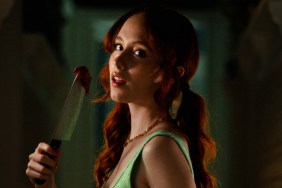
Watching Francis Ford Coppola’s Tetro I came away with something of a soothing sensation. Visually, it’s an absolutely beautiful film, shot in widescreen black-and-white with bold splashes of color peppered throughout. The story is a delicately told narrative that draws several similarities from Coppola’s personal life, yet more than enough differences to make sure it is not at all autobiographical. While the ending suffers from an extremely melodramatic climax, Tetro is so comforting to watch, elegantly told and superbly acted it is one I could return to again and again.
The story begins with the unexpected arrival of 17-year-old Bennie (Alden Ehrenreich) at his older brother Tetro’s (Vincent Gallo) Buenos Aires apartment. There is obvious tension coming from the closed bedroom door that keeps Tetro hidden at the outset as deep-rooted family secrets become the order of the day. Both brothers are trying to escape the shadow of their father (Klaus Maria Brandauer), but both in entirely different ways.
Tetro, referred to by his girlfriend (Maribel Verdú) as a “genius with none of the accomplishments,” escaped his father by running to Argentina where he has lived for over ten years. But along with leaving his father behind he also left Bennie, whom he told he would come back for one day, only he never did. Bennie now shows up on his doorstep filled with questions and the movie, as a result, is all about getting the answers.
For the most part Tetro is comfort food. There are no grand gestures and even the more affecting and climactic moments are handled gently, tying in the plot with the music of Bennie and Tetro’s father, a big shot orchestra conductor in competition with all that surround him. Ultimately, what really is a solemn film manages to rise above its protagonist’s angst and deliver a heartfelt story of a family divided and what they have to go through to come together.
Bathed in black-and-white, Tetro is reminiscent of features from the ’40s and ’50s. Most notable are influences from the French and Italian cinema. Perhaps this is where I found my particular level of comfort, because no sooner than the film started with a scene that brings back memories of Rene Clement’s Forbidden Games, I felt I was trapped in a world inspired by the likes of Federico Fellini and Michelangelo Antonioni. Of course, this is only from a visual perspective as Tetro doesn’t manage to even touch on the depths of something such as Forbidden Games or the work of Fellini and Antonioni, but the idea of a film nowadays even suggesting a comparison is notable.
Beyond the look of the film, the most impressive component of Tetro is newcomer Alden Ehrenreich, who enters this film as a complete unknown and has you walking out anxious to see what he will do next. Comparisons to Leonardo DiCaprio are without a doubt valid, and not even a young DiCaprio as Ehrenreich’s performance comes off as a seasoned professional and acting opposite someone that commands the camera’s attention such as Vincent Gallo couldn’t have been an easy task. The rest of the cast satisfies as well, especially a female critic known only as Alone (Carmen Maura), who felt as if she had fallen out of a Fellini film and into Coppola’s Argentina.
However, even after all this praise, the film is not altogether perfect. The visuals are stellar and the acting is top notch, but the story is lacking. For all it has to offer in the early moments it didn’t earn the over-the-top melodramatic ending Coppola tried to pull off. The film lingers a little long at times, expanding its story needlessly, but this may in fact end up being the stepping stone to Coppola’s next true classic
Tetro marks Coppola’s second self-financed film following 2007’s Youth Without Youth and it is a tremendous improvement over the previous film, which I had a hard time even trying to finish. It has been Coppola’s dream to reach a moment in his life where he could make the independent, more personal films and not rely on Hollywood for the money to make them. He told me he could “stretch it up to around $15 million” he is willing to lose on these films, which is a real risk, but when it comes to achieving artistic greatness a little bit of risk can go a long way. We’ll have to wait and see how Coppola’s risk ultimately pays off.










